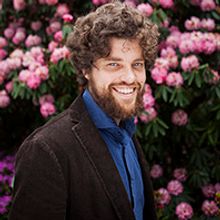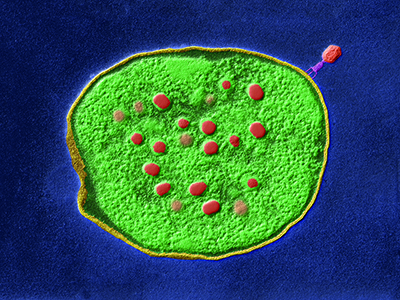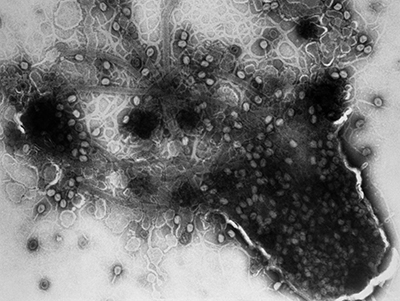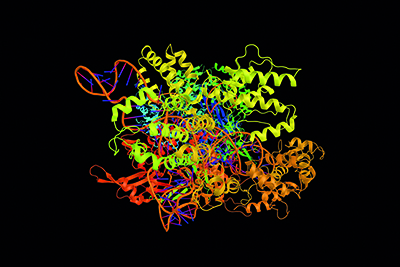An interview with Fleming Prize winner Professor Edze Westra
Issue: Fleming Prize Winners
20 October 2020 article

Professor Edze Westra, University of Exeter, was awarded this year’s Fleming Prize for his work on the molecular mechanisms and evolutionary ecology of CRISPR-Cas systems. He spoke to Dr Rebecca Hall about what winning the prize meant to him and where he sees his field in the future.
Could you provide a brief description of the work that you were awarded the Fleming Prize for?
I study the interactions between bacteria and their viruses. My PhD research was on the molecular mechanisms of CRISPR-Cas and then my first postdoc position moved into a slightly different area to focus on when these defence systems are important and why these systems are there in the first place, the impact of communities and cooperation, and the importance of ecological variables. Cells tend to defend themselves against phage infection by mutating the receptor that the phage uses to get into the cell; rarely do the bacteria use CRISPR systems instead. Why is this? I moved on to a NERC Independent Research Fellowship in 2015 to start answering these questions, looking at the evolutionary consequences of CRISPR-Cas systems and the ecological conditions that favour these defences. Recently, many more bacterial defence mechanisms have been identified. The over-arching question that my group is trying to answer is “when do all these different systems come into play, and when they do, what is the consequence of this?”

Given unlimited funding, what direction would you take your group in?
We recently found that the presence of certain bacterial species in the environment increases the likelihood that other bacterial species evolve CRISPR immunity against phage. The bacteria we used in this study are opportunistic human pathogens and we found that this change in phage resistance evolution has important knock-on effects for the virulence levels of these bacterial pathogens. This is an exciting, novel area of research, which I will continue to explore in collaboration with medical microbiologists. Another area that I am super excited about at the moment is the idea of viruses communicating with one another to make decisions about their infection strategy; whether they enter the lytic or the lysogenic lifecycle. I want to understand how common this communication mechanism is, and when it provides a clear advantage to the phages.
What does it mean to you to be awarded the Fleming Prize?
It’s fantastic! The Fleming Prize is the most prestigious award in microbiology for anyone at my career stage. Looking at the list of previous winners, it is an absolute honour to join them. I am also really excited to provide the lecture to go along with this prize (find out more on the digital events page).

Why does microbiology matter?
For so many reasons. The human health perspective is the most obvious, but there are also applications in industry and the economic interest in, for example, determining crop yields. Arguably the most important role that microbiology plays is in keeping the planet alive by maintaining the important nutrient cycles.
What advice do you have for early career researchers looking to build a career in academia?
Maximise your outputs by not sitting on your data for too long. Understand your field so that you are in a good position to obtain fellowships. Your PhD should hopefully expose you to a lot of training and mentorship so that at the end you are in a good position to tackle a really unique piece of work. The most important thing is to choose a postdoc that you are super passionate about; that will give you the energy and resilience that you need to deal with the hard work and the disappointments that come with the job. What are you most interested in? Think about your one really big idea, then break it down into achievable projects that can span a postdoc or two. Consider your advisor carefully. Do they have the infrastructure and research environment to support you in achieving your goals? I was fortunate to have a great postdoc supervisor in Professor Angus Buckling for my Marie Curie Fellowship and I’m still learning so much from the people around me. Good mentorship is so important at all career stages.
Do you have a favourite paper that you are particularly proud of or that has been pivotal for you?
I am really excited about the work we published last year on how natural selection can favour the loss of CRISPR immune systems. We expected that having CRISPR systems can be maladaptive in certain conditions, but we're not sure why. We found evidence that when a phage integrated its genome into that of the host during lysogenic infection, the CRISPR system can still recognise this. This then causes cells to destroy their own genomes, which in turn results in strong selection for bacterial mutants that lost their CRISPR-Cas immune system. I really like this work because it finally provided a mechanism for why bacteria get rid of their immune system. We also had another exciting paper that showed a positive-feedback loop can occur in the dynamics of phage infection. Phages can carry anti-CRISPR genes, but these are imperfect because they take time to act. Infections are removed by the immune systems before the anti-CRISPR products can block the complexes, but they still produce immunocompromised bacterial cells and the numbers of these cells will build up as the number of phage particles increases, eventually leading to a threshold above which we can observe successful viral replication. We realised the phages need to cooperate to overcome the CRISPR immunity of their host, which is really exciting.

Finally, what do you particularly enjoy about your current career stage?
I am super excited about the science that we do, of course, but I am also particularly excited by seeing the people in my lab have really fantastic outputs and moving on to establish their own groups. I have always benefitted from amazing mentors and I am really proud to think that I might be starting to pay that back.
Interviewer: Rebecca J. Hall
Research Associate, University of Nottingham, UK
